
International Journal of Unconventional Computing
Scope & Guideline
Connecting Scholars through Innovative Computing Insights
Introduction
Aims and Scopes
- Unconventional Computing Paradigms:
Research on non-standard computing models, including quantum computing, cellular automata, and reservoir computing, which challenge classical computation theories. - Natural Computing and Biomimetic Systems:
Investigations into natural processes and biological systems as inspirations for computing, including studies on fungal networks and biological sensors. - Complex Systems and Complexity Science:
Exploration of complexity in computational systems, including the role of natural computing in complexity science and the dynamics of complex networks. - Neuromorphic and Spiking Neural Networks:
Development and application of neuromorphic computing systems that mimic biological neural networks, focusing on spiking neural P systems and their applications in various domains. - Interdisciplinary Applications:
Utilization of unconventional computing approaches in diverse fields such as environmental monitoring, healthcare diagnostics, and artificial creativity, highlighting the applicability of theoretical models.
Trending and Emerging
- Quantum Computing Innovations:
Recent publications have increasingly focused on quantum computing, with studies on quantum algorithms and entanglement, indicating a growing interest in harnessing quantum mechanics for computational purposes. - Biologically-Inspired Computing:
The exploration of biosensors and biomimetic systems, such as fungal environmental sensors, is on the rise, showcasing a trend towards integrating biological principles into computing methodologies. - Reservoir Computing Advances:
Research on reservoir computing, particularly with innovative materials like magnetic thin films, is gaining prominence, reflecting a shift towards new implementations of this computational model. - Artificial Creativity and Neural Dynamics:
There is a notable trend towards exploring artificial creativity through nonlinear dynamics and neuromorphic systems, emphasizing the intersection of art and science in computational research. - Complexity and Systems Dynamics:
Studies focusing on the dynamics of complex systems, including the role of criticality in neuronal networks and evolutionary algorithms, are increasingly prevalent, highlighting the journal’s commitment to understanding complex interactions.
Declining or Waning
- Traditional Algorithmic Approaches:
There is a noticeable decrease in papers focusing on conventional algorithmic methods, as the journal increasingly favors innovative and unconventional computational techniques. - Single-Domain Studies:
Research that solely addresses a single domain without interdisciplinary connections is becoming less common, as the journal emphasizes cross-disciplinary approaches. - Static Computational Models:
The exploration of static or non-dynamic models is declining, with a shift towards more dynamic, adaptable systems that reflect real-world complexities. - Classical Logic Gate Applications:
Applications of traditional logic gates are appearing less frequently, as newer methods and models, such as threshold logic and memristive systems, gain traction.
Similar Journals
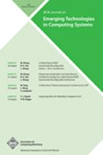
ACM Journal on Emerging Technologies in Computing Systems
Catalyzing Innovation in Electrical and Electronic EngineeringACM Journal on Emerging Technologies in Computing Systems, published by the Association for Computing Machinery, stands as a premier platform dedicated to the exploration and discussion of avant-garde advancements in computing systems. With an ISSN of 1550-4832 and an E-ISSN of 1550-4840, this journal has achieved notable recognition, holding a 2023 Q2 ranking in key fields such as Electrical and Electronic Engineering, Hardware and Architecture, Nanoscience and Nanotechnology, and Software. Spanning from 2005 to 2024, it provides a critical forum for researchers, professionals, and students alike to disseminate innovative research and applications that shape the future of technology. Although currently not open access, the journal's commitment to high-quality, peer-reviewed content ensures its relevance and impact, as reflected in its competitive Scopus ranks across various disciplines. Engage with groundbreaking research that propels the frontiers of computational systems in this dynamic academic journal.

EUROPEAN PHYSICAL JOURNAL B
Fostering Innovation in the Heart of Physics ResearchEUROPEAN PHYSICAL JOURNAL B (ISSN: 1434-6028, E-ISSN: 1434-6036), published by Springer, is a prominent international journal based in Germany that focuses on the fields of Condensed Matter Physics and Electronic, Optical and Magnetic Materials. With a converged publication timeline from 1998 to 2024, it caters to a diverse audience that includes researchers, professionals, and students striving for the latest advancements in these vital areas of physics. The journal is recognized with a Q3 ranking in both relevant categories for 2023, showcasing its solid yet notable standing within the academic community. Although currently without an H-index, its Scopus rankings reflect a percentile performance of 41st and 39th, respectively, indicating a growing influence among its peers. The journal offers open access options, ensuring that groundbreaking research is widely accessible and contributes to the collective knowledge within the scientific domain. By aiming to publish high-quality, well-researched articles, the EUROPEAN PHYSICAL JOURNAL B plays a crucial role in disseminating innovative findings and fostering collaboration in the field of physics.
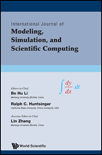
International Journal of Modeling Simulation and Scientific Computing
Exploring New Dimensions in Computational ScienceThe International Journal of Modeling Simulation and Scientific Computing, published by WORLD SCIENTIFIC PUBL CO PTE LTD, is a pivotal resource in the realms of Computer Science Applications and Modeling and Simulation. With an ISSN of 1793-9623 and an E-ISSN of 1793-9615, this journal serves as a platform for innovative and high-quality research from 2010 to 2024, contributing to the advancement of methodologies and applications in various scientific fields. Although currently categorized in the Q4 quartile for both recognized domains and positioned in the 42nd and 36th percentiles in the Scopus rankings for Mathematics and Computer Science respectively, the journal encourages scholarly exchange and fosters the integration of modeling and computational analysis in scientific research. Researchers, professionals, and students alike will find this journal an essential tool to stay updated with trends, methodologies, and cutting-edge findings in simulation and computational techniques that drive scientific inquiry today.
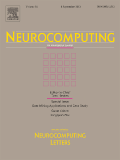
NEUROCOMPUTING
Innovating at the Convergence of Neuroscience and TechnologyNEUROCOMPUTING is a premier academic journal published by ELSEVIER, specializing in the interdisciplinary fields of Artificial Intelligence, Cognitive Neuroscience, and Computer Science Applications. With an impressive impact factor and a Q1 ranking in its relevant categories for 2023, NEUROCOMPUTING is recognized as a leader in fostering innovative research and providing a platform for ground-breaking studies. The journal’s scope covers the convergence of neural computation and artificial intelligence, making it essential reading for researchers and professionals seeking to explore the latest advancements and applications in these dynamic fields. For those interested in the cutting-edge intersection of neuroscience and computational techniques, NEUROCOMPUTING offers a wealth of knowledge that significantly contributes to both theoretical and practical advancements. The journal is dedicated to publishing high-quality, peer-reviewed articles and is an invaluable resource for students and established scholars alike, looking to stay at the forefront of research trends.
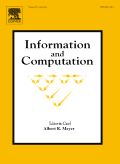
INFORMATION AND COMPUTATION
Innovating Theories and Applications in Computer ScienceINFORMATION AND COMPUTATION is a peer-reviewed academic journal published by Academic Press Inc., Elsevier Science, dedicated to advancing the fields of computational theory and mathematics, computer science applications, and information systems. With an ISSN of 0890-5401 and an E-ISSN of 1090-2651, the journal provides a platform for innovative research that spans theoretical and applied perspectives. Acknowledged for its impact in the community, it holds a Q2 quartile ranking in several categories, including Computational Theory and Mathematics and Computer Science Applications, as of 2023. These rankings place it among the leading journals in its field, making it an essential resource for researchers, professionals, and students aiming to stay abreast of cutting-edge developments. While it does not currently offer Open Access options, the journal intends to foster scholarly communication and knowledge sharing from its inception in 1987 to its future issues expected through 2024. Located in the United States, at 525 B ST, STE 1900, SAN DIEGO, CA 92101-4495, INFORMATION AND COMPUTATION is committed to publishing high-quality research that influences the theoretical foundations and practical applications of its diverse disciplines.

Journal of Grid Computing
Pioneering Discoveries in Collaborative ComputingThe Journal of Grid Computing, published by Springer, stands as a pivotal resource in the dynamic field of computer science, particularly within the realms of Computer Networks and Communications, Hardware and Architecture, Information Systems, and Software. With an impressive Q1 ranking across these categories in 2023, the journal exemplifies excellence and rigor, catering to a diverse readership from researchers to industry professionals. Established in 2003, this esteemed journal is anchored in the Netherlands and releases cutting-edge research that reflects trends and advancements in grid computing technologies. Researchers can gain insights through its vast contributions, while institutions benefit from its prestigious standing within the SCOPUS framework, boasting high percentile ranks in multiple computer science categories. Though not open access, the journal provides unparalleled access options for institutional subscribers, solidifying its importance as a gateway to innovative discoveries in high-performance distributed computing.

International Journal of Networked and Distributed Computing
Driving Insights in Computer Networks and BeyondWelcome to the International Journal of Networked and Distributed Computing, published by SpringerNature, a premier outlet for cutting-edge research in the realms of computer networks and distributed computing systems. Established as an Open Access journal since 2013 and based in the Netherlands, this publication strives to disseminate high-quality, peer-reviewed studies that address the complexities of contemporary computing challenges. With an impact factor that reflects its growing influence—positioned in the Q3 category for both Computer Networks and Communications and Computer Science Applications—this journal serves as a pivotal resource for scholars and practitioners aiming to advance knowledge and innovation in this rapidly evolving field. The journal encompasses diverse topics, from network protocols to distributed algorithms, ensuring that researchers, professionals, and students can find relevant insights and methodologies to inform their work. Join us in exploring the depths of networked and distributed computing, contributing to a collaborative academic environment that shapes the future of technology.

Theory of Computing
Exploring the Depths of Theoretical FrameworksTheory of Computing, published by the University of Chicago, Department of Computer Science, is a prestigious journal that has established itself as a leading platform in the fields of Computational Theory and Theoretical Computer Science. With its ISSN 1557-2862, the journal has earned a reputation for high-quality, peer-reviewed research, positioning itself in the Q1 quartile for both Computational Theory and Mathematics, as well as Theoretical Computer Science as of 2023. Despite its limited open access options, the journal remains a vital resource for researchers and academics, providing insights that push the boundaries of theoretical frameworks and methodologies in computer science. The journal's commitment to rigorous scholarship serves to foster innovation and deepen understanding in a rapidly evolving field, making it an essential reference for professionals, students, and practitioners alike.
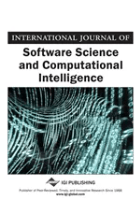
International Journal of Software Science and Computational Intelligence-IJSSCI
Exploring New Dimensions in Software Engineering and AIInternational Journal of Software Science and Computational Intelligence (IJSSCI) is a prominent academic journal published by IGI Global, dedicated to advancing the fields of software science and computational intelligence. With its ISSN 1942-9045 and E-ISSN 1942-9037, IJSSCI offers a platform for researchers, practitioners, and students to disseminate innovative research findings, theoretical advancements, and practical applications in areas such as algorithm development, machine learning, and software engineering. Although the journal currently does not operate under an open access model, its rigorous peer-review process ensures high-quality publications that contribute significantly to the academic discourse. Based in Hershey, PA, IJSSCI is recognized for its commitment to fostering collaboration among professionals in the technology and computer science fields, making it an essential resource for those looking to stay at the forefront of software science advancements.

Science China-Information Sciences
Pioneering Knowledge in the Evolving Landscape of Information Sciences.Science China-Information Sciences is a prestigious academic journal published by SCIENCE PRESS, dedicated to advancing knowledge in the field of information sciences and computer science. Established in China, the journal has gained a remarkable reputation, with a 2023 category quartile ranking of Q1 in Computer Science (miscellaneous) and an impressive Scopus rank of #16 out of 232 in General Computer Science, positioning it within the 93rd percentile. The journal embraces a broad spectrum of topics, from theoretical frameworks to practical applications, providing a platform for researchers, professionals, and students to disseminate their findings and engage with the latest advancements in the field. With open access options available, Science China-Information Sciences ensures that innovative research is accessible to a global audience, fostering collaboration and interdisciplinary dialogue. The journal not only reflects the evolving landscape of information sciences but also plays a pivotal role in shaping future research directions.